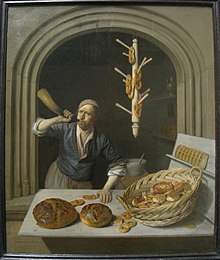Baker
A baker is a tradesperson who bakes and sometimes sells breads and other products made of flour by using an oven or other concentrated heat source.[5] In Medieval Europe, baking ovens were often separated from other buildings (and sometimes located outside city walls) to mitigate the risk of fire.[5] Because bread was an important staple food, bakers' production factors (such as bolting yields, ingredients, and loaf sizes) were heavily regulated.[6] Soon after the enactment of the Assize, "baking became a very stable industry, and was executed much more professionally than brewing, resulting in towns and villages having fewer bakers than brewers.Bakers were among the thousands of servants who served in the Ming Palace,[10] including recruited cooks, imperial eunuchs, and trained serving-women (Shangshiju).[14] In addition to the secular aspect of baking, Ming bakers also were responsible for providing pastries for use in various rituals, festivals and ceremonies, such as zongzi.[22] Joseph Lochner, a bakery owner in Utica, New York, was subsequently convicted of violating the law for forcing his employees to work more than sixty hours a week.[26][27] Equivalent family names of occupational origin meaning "baker" exist in other languages: Boulanger, Bulinger, Dufour, and Fournier in French, Bäcker in German, and Piekarz in Polish.Bakers produce various types and quantities of breads, pastries, and other baked goods sold by grocers, wholesalers, restaurants, and institutional food services.OOH reports that bakeries, "especially large manufacturing facilities, are filled with potential dangers such as hot ovens, mixing machines, and dough cutters.Although their work is generally safe, bakers may endure back strains caused by lifting or moving heavy bags of flour or other products.




Baker (disambiguation)kneading (cats)U.S. NavyUSS John C. Stennisaircraft carrierVocationalApprenticeshipoil-on-canvasJob Adriaensz BerckheydeWorcester Art MuseumtradespersonbreadsbakeryHistory of breadgrainsstaple foodancient GreeksAthenaeusancient RomeslavesartisansmanumittedMedieval Europecity wallsproduction factorsHenry III of EnglandAssize of Bread and Aleweights and measuresquality controlprice controlscapital investmentsjourneymenAmsterdamfraternityLondonExchequerWorshipful Company of Bakerslord mayor of LondonMing dynastyimperial eunuchszongziFeng MenglongWater MarginWu DalangQiu YingAlong the River During the Qingming FestivalThe Plum in the Golden VaseColumbian ExchangeCaribbeanchocolateOld Worldsugar beetsAntoine-Augustin ParmentierManchesterIndustrial Revolutioncloth manufacturertavernpublic housecotton spinnermerchantcalicogrocerNew York State AssemblystatesUtica, New YorkU.S. Supreme CourtLochner v. New YorkOliver Wendell Holmesfreedom of contractlaissez-faireLochner eraJerusalemEucharistElishamiracle of the multiplication of the loavesBethlehemRoman Catholicpatron saintHonoratus of Amiensbishop of AmiensSt. Honoré cakeLazarus of BethanyBaker (surname)English surnameFrenchGermanPolishOccupational Outlook HandbookBureau of Labor StatisticsUnited States Department of Laboroccupational hazardsapronsBaker's asthmaallergensenzymesAspergilluspastry chefsrolling pintortillagrocery storesrestaurantsself-employedhardtacksNorwayRiyadhSamuel Bath ThomasBagel Bakers Local 338Bakehouse (building)Baker's percentageBaker's yeastBakers, Food and Allied Workers' UnionBakery, Confectionery, Tobacco Workers and Grain Millers' International UnionBread machineCake shopChorleywood bread processCoffee cakeList of baked goodsList of bakersList of bakeriesList of restaurant terminologyPastry chefPâtisserieProofing (baking technique)Sliced breadVienna breadWhite bread